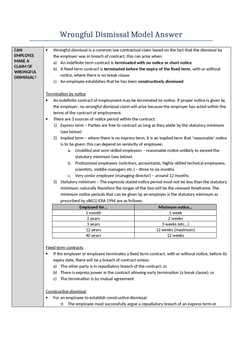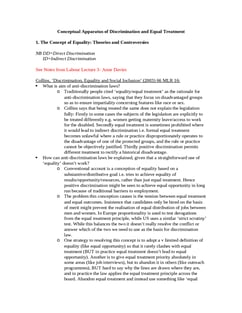Shamoon v Chief Constable of the Royal Ulster Constabulary [2003] IRLR 285
Judgement for the case Shamoon v Chief Constable of the Royal Ulster Constabulary
Table Of Contents
Plaintiff was not allowed to carry on doing appraisals due to complaints made against her, though her two male colleagues were.
-
She alleged sex discrimination under the equivalent (same wording) of s.1(1)(a) SDA 1975 for Northern Ireland.
She said that the test of ‘treats her less favourably than he treats or would treat a man’ was demonstrated by the fact that her colleagues were allowed to continue doing appraisals.
HL rejected her claim, saying that her colleagues weren’t valid comparators since they had not had complaints made against them.
Lord Nicholls
It doesn’t matter whether a comparator is an actual person or hypothetical.
The ‘less favourable treatment’ than would be given to a man is in practice asked first by employment tribunals, who proceed secondly to the question of whether the reason for the differential treatment was because Plaintiff is a woman.
The first question is a threshold that has to be passed before proceeding. This is problematic:
Sometimes the less favourable treatment issue cannot be resolved without, at the same time, deciding the reason why issue.
Hence no need to look at comparators separately from the reason for discrimination: If Plaintiff was treated worse then the reason was sex, race, etc. If not then Plaintiff wasn’t treated less favourably.
This is a good example - the alleged comparators were in fact shown not to be comparators because of the reason for the different treatment (complaints made).
Equally, if we ask was Plaintiff treated less favourably than a hypothetical male officer, who had had complaints made, would have been, we have to think about the reasons for her treatment.
The most convenient and appropriate way to tackle the issues arising on any discrimination application must always depend upon the nature of the issues and all the circumstances of the case. There will be cases where it is convenient to decide the less favourable treatment issue first.
But, for the reason set out above, when formulating their decisions employment tribunals may find it helpful to consider whether they should postpone determining the less favourable treatment issue until after they have decided why the treatment was afforded to the claimant.
Instead of the ‘but for’ test he asks ‘what was the reason for the treatment’ due to difficulty with comparators.
Lord Hope
The choice of comparator requires that a judgment must be made as to which of the differences between any two individuals are relevant and which are irrelevant.
The choice of characteristics may itself be determinative of the outcome...This suggests that care must be taken not to approach this issue in a way that will defeat the purpose of the legislation, which is to eliminate discrimination against women on the ground of their sex in all the areas with which it deals.
This is a more purposive approach, viewing the comparator merely as a tool towards a particular end rather than integral to the test itself.
For Further Study on Shamoon v Chief Constable of the Royal Ulster Constabulary

A collection of the best LPC Employment notes the director of Oxbridge ...
Need instant answers? Our AI exam tutor is here to help.
Ask questions 🙋 Get answers 📔 It's simple 👁️👄👁️
Our AI is educated by the highest scoring students across all subjects and schools. Join hundreds of your peers today.
Get StartedSimilar Cases
Related Product Samples
These product samples contain the same concepts we cover in this case.
| Employment Law | Disability Discrimination Notes (28 pages) |
| Employment Law | Indirect Discrimination Harassment And Et1 3 Forms Notes (38 pages) |
| Labour Law | Labour Discrimination Notes (64 pages) |

 Since 2010, Oxbridge Notes has been a trusted education marketplace, supplying high-quality materials from top achievers at universities like Oxford, Cambridge, LSE, Harvard, and Yale.
Since 2010, Oxbridge Notes has been a trusted education marketplace, supplying high-quality materials from top achievers at universities like Oxford, Cambridge, LSE, Harvard, and Yale.